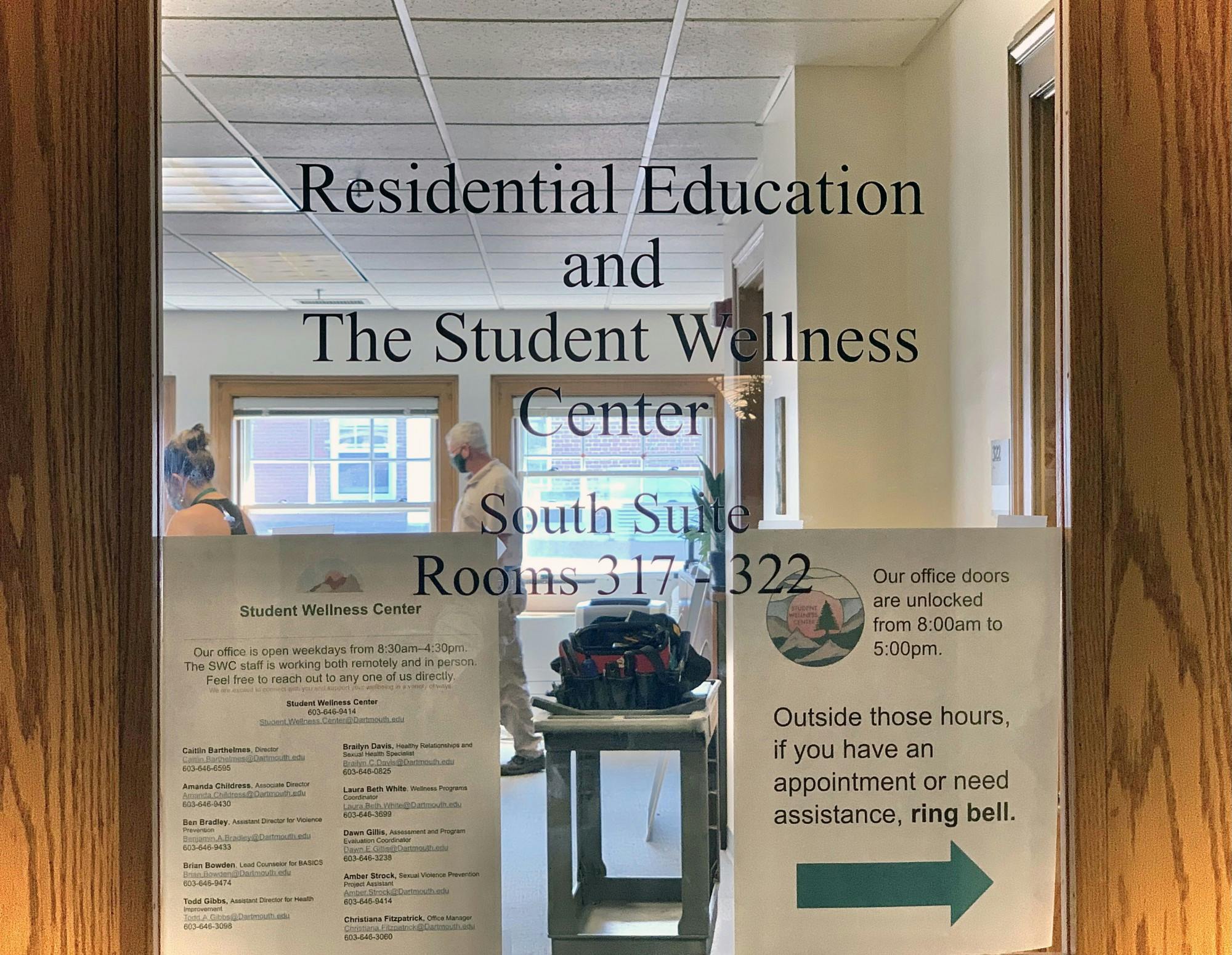This article is featured in the 2021 Freshman special issue.
The transition to college can be stressful, and many students may find that they struggle with their mental health during their adjustment. But from student-led groups to nonprofits and professional campus divisions, there are a variety of resources available on campus for students seeking mental health support.
Associate dean of student support services Anne Hudak said her best piece of advice for freshmen is to always reach out — early and often — for support when they need it. Whether it be from the Undergraduate Deans Office, an undergraduate advisor, the Student Wellness Center or a roommate, taking care of one’s mental health should be a priority.
“I think of the Undergraduate Deans Office as a resource students can come to when something just seems off, something just doesn’t seem right,” Hudak said. “We can talk students through that and suggest some resources they might be able to reach out to.”
Another major resource is Dick’s House Health Services, which offers short-term individual counseling, group therapy, Dartmouth Cares Suicide Prevention, psychiatric medication evaluations and medication management, ADHD assessments, consultation and referral and nutrition and wellness services.
Dick’s House associate director Dr. Alex Lenzen said there are “so many misconceptions” about the Counseling Center at Dick’s House, especially around wait times and what students can say without fear of being punished.
Lenzen stressed that Dick’s House has a counselor on call 24/7, every day of the year — including holidays.
“I often hear students saying they can’t get in for weeks, but the average wait time for a first appointment is two to three days,” Lenzen said. “We always have crisis services available, so we have a counselor on call 24/7, every day of the year, holidays, breaks, we’re always here. If students need support urgently, they can always come to us, there’s not that couple of weeks’ wait.”
Lenzen noted that many students fear what might happen with the information that they share in the Counseling Center, but their privacy is much more protected than students might realize.
“I think a really big misconception is that if somebody talks about suicidal thoughts or feelings they will be sent home, and that’s just not true,” Lenzen said. “I would say about 50% of the students we see — and we see about a fourth of the student body — talk about suicidal thoughts and feelings, and we hardly ever send students home without their choice; that happens maybe once every three years.”
An investigation into mental health resources on campus by The Dartmouth, released in July, found that the College had made some changes over the course of the pandemic to make care more accessible, including hiring more counselors, but that there are also several major areas for improvement in the school’s mental health infrastructure — including mental health leave policy and a lack of long-term care options.
According to Lenzen, Dick’s House and the Student Wellness Center are both complementary resources. While Dick’s House offers clinical counseling services, the Student Wellness Center offers proactive, preventative wellbeing support.
Student Wellness Center director Caitlin Barthelmes emphasized the importance of early intervention, noting a general tendency to wait until stress, anxiety and other unpleasant emotions build up and cause barriers to students’ productivity and mental health.
“If we wait until that boilover point, it may involve needing a higher level of professional support” said Barthelemes. “Whereas, if we’re able to create a daily practice of pausing to check in with ourselves and how we’re feeling, it allows for an increase in our ability to know ourselves and to take action to improve our emotional health.”
According to Barthelmes, the mission of the SWC is to “empower the student community to thrive while at the College and beyond.” Barthelmes identified four evidence-based processes that can help students: self-reflection, connection with others, intention and commitment and drawing on values to inform actions
One of the SWC’s goals for this year, Barthelmes said, is to “focus on normalizing tending to mental and emotional health as a daily practice in the student community.”
Well-being and mindfulness specialist Laura White said that the SWC will continue their weekly, free-flowing mindfulness drop-ins this fall to encourage this practice. Mindfulness drop-ins are open to all undergraduates to come and go as they please, as well as another four-week, free Koru mindfulness course that will take place in a group cohort and meet once a week.
White stressed the importance of eliminating money, time and location as obstacles to learning mindfulness. According to White, the SWC’s SoundCloud and YouTube pages contain over fifty different meditations and yoga practices of varying lengths and styles.
“We have a huge library of virtual resources,” White said. “Students who can’t get to a drop-in or don’t have time for a four-week class might be able to just try a three-minute practice on their own, or a 15-minute practice on their own. Whatever they’re looking for, we’re trying to really create a lot of different entry points.”
Barthelems emphasized the importance of finding a caring listener, and noted the availability of SWC’s wellness check-ins, which she described as one-on-one, student-scheduled conversations in a non-judgemental place to discuss anything somebody may be going through with either a professional SWC staff member or in a co-facilitated session with a graduate student.
Mental Health Union peer support program director Felicia Ragucci ’22 said that she found the SWC’s 45-minute to one-hour wellness check-ins helpful as a freshman and continues to utilize this resource.
“I think that [the wellness check-ins] are a really great resource available to students because it’s not a full-time commitment where you have to go through counseling and that sort of process,” Ragucci said. “It’s just something that you can do when you want someone to talk to and you just want someone to listen.”
Another conversation-based resource is MHU’s peer support program, a student-led, private mental health resource available to all undergraduates. Since its launch in spring of 2019, the peer support program has expanded from operating two nights a week to every night.
Ragucci encouraged freshmen to join the peer support volunteer and mental health ambassador training starting this fall.
“We definitely encourage and would love to have ’25s apply to become peer support volunteers,” Ragucci said. “Also, we have students in student groups all across campus who can become mental health ambassadors for whatever that student group is. They’re in touch with us and we provide them with resources, updates and information that they can then funnel to their group.”
MHU ambassador program vice president Audrey Herrald ’23 used peer support during her freshman year and described it as a “really great, easily accessible, very low stress type of environment.”
Another peer-led resource is the Sexual Assault Peer Alliance, which according to SAPA advisor Brandon Zhou ’22 provides a “survivor-centered approach to how students support their peers.” Trained peer advisors talk through issues to whatever extent an individual feels comfortable with and can connect them to resources such as the Title IX Office or WISE, a local organization that supports survivors of gender-based violence.
Zhou said he believes that SAPA occupies a “unique space” in that the organization consists of students who have been trained by the Counseling Center on how to best support survivors and people who have experienced sexual abuse or sexual or gender-based violence.
“One thing that I might just stress is that we are a peer resource,” Zhou said. “We are students’ peers, and I think that we’re a great resource especially if you’re not really sure what you want to do. We are able to connect you to different resources and support structures from around campus and also off campus.”
Eva Yao ’23 is the CEO of FORT, a nonprofit student-run organization that also provides on- and off-campus support to students and works to destigmatize mental health on campus and reduce financial barriers to obtaining care.
“I came up with this idea because I felt that throughout my Dartmouth experience, the College has lacked in mental health support,” Yao said. “Especially with what the ’24s went through with the consecutive suicides, I felt like the school was not doing nearly enough and the students felt really unsupported. I genuinely care about our community and really wanted to do something to make a difference.”
According to Yao, FORT has raised around $10,000 this summer through fundraising events, alumni donations and large corporation matching to be used in a pilot program in the fall geared toward supporting students in their mental health pursuits.
To make the process of searching for providers easier, FORT has partnered with numerous College alumni and nearby resources such as Hanover Psychiatry, although students are free to choose from whichever providers they would like. The organization plans to allocate funds on a first come, first served basis and provide up to $350 a month to cover the costs of an individual’s mental health appointments.
FORT also hosts a bimonthly speaker series to tackle the stigmatization of mental health issues, which is open for students to candidly share their experiences.
“We’re very open for ’24s and ’25s to come and just listen to our experiences, or if they want to speak, that’s also awesome,” Yao said. “I think that can be another outlet for them to feel supported in the community. It’s going to be a very safe space and we’re hoping to have it on campus this fall.”
The Tucker Center for Spiritual and Ethical Life offers students that feel more comfortable in a faith-based space a place for conversation and reflection. The Center hosts weekly multifaith conversations — spaces where students can receive mutual comfort from talking openly about how faith and spirituality affects their lives and campus experiences with other people also interested in this idea.
“People can come from a variety of faith backgrounds or no faith background, just people who have some sort of tangential interest or connection to faith and spirituality,” Tucker Center major events coordinator Attiya Khan ’22 said. “We sometimes touch on mental health topics, [and] sometimes we talk about specific experiences that can be tough at Dartmouth, like balancing being in a new environment and how faith and spirituality can help.”
Khan noted that the Tucker Center is an an “interesting transitory stage” because of former Tucker Center chaplain Daveen Litwin’s recent departure from the College, but if students would like to have a more specific conversation with someone who shares the same faith as them, the Center offers access to student advisors and staff of different religious backgrounds.
Academic Skills Center interim director Karen Afre said that all of the ASC’s programs consider how to incorporate other campus resources, such as the SWC and the counseling center.
“I always work with my students in academic coaching and let them know that your number one priority is your health and wellness,” Afre said. “In close second, if you want it to be, is your academics, and then you get to really rank your priorities.”
Afre emphasized that students need to know their mental health should never be sabotaged at the expense of their academics, and there are both academic and emotional support systems in place to make sure this does not happen.
“If ’25s feel overwhelmed by the initial experience, there are people here who’ve been through it, and we’re more than willing to talk about it and work with them through it,” Khan said. “If you’re comfortable with more formal counseling go to Dick’s House or if you’re somebody who’s very into their faith, you can come to Tucker Center. There’s also the Student Wellness Center, so there [are] lots of different approaches and ways people can seek help. The important thing is it’s all right to not be okay.”





